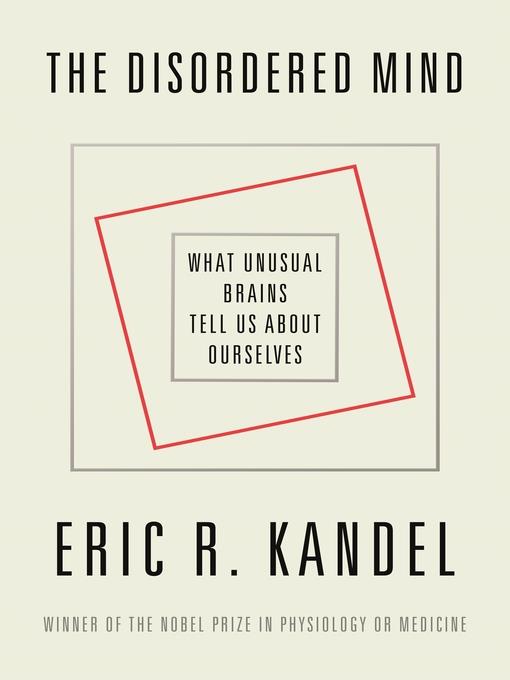
The Disordered Mind
What Unusual Brains Tell Us About Ourselves
چه موجودات غیر معمول در مورد خودمان به ما میگویند
کتاب های مرتبط
- اطلاعات
- نقد و بررسی
- دیدگاه کاربران
نقد و بررسی

June 1, 2018
The eminent neuroscientist examines what the injured or diseased brain can tell us about a healthy one."Today, as never before, the study of brain disorders is giving us new insight into how our mind normally functions," writes Nobel Prize winner Kandel (Neuroscience/Columbia Univ.; Reductionism in Art and Brain Science: Bridging the Two Cultures, 2016, etc.). That "normal function" is a complex process involving many parts of the brain, reflecting the emergent fact that consciousness is not a single function of the brain but instead a continuum of "different states of minds in different contexts." Complex cognitive skills such as understanding speech require input from several widely separated areas of the brain, including the arcuate fasciculus and Broca's area, while the generation and execution of emotion involve the hypothalamus, striatum, prefrontal cortex, and one tiny part of the brain whose functions are just being understood: "When we laugh or cry--when we experience any emotion--it is because these brain structures are responding to the amygdala, and acting on its instructions." But just so, writes Kandel, problems such as addiction also involve several brain regions and neural circuits, requiring multiple approaches to any neuroscientific regime of treatment. Autism is another such area, manifesting itself in failures in the complex problem of interpreting "biological motion," which in turn "enables us to recognize intention, which is critical to a theory of mind." In the end, understanding various states of brain function in varying degrees of health helps address not just the question of consciousness, modern theories of which Kandel addresses in closing, but also the much larger issue of human nature and what it entails. Throughout, the author writes accessibly, though it may help readers to have some background in neuroscience and anatomy.Synaptic pruning, folded proteins, adaptive habits: all fascinating stuff ably interpreted by a master.
COPYRIGHT(2018) Kirkus Reviews, ALL RIGHTS RESERVED.

Starred review from June 11, 2018
Nobel Prize–winning-neuroscientist Kandel (Reduction in Art and Brain Science) delves optimistically into the current state of the “new biology of mind,” a sophisticated framework deriving from “the marriage of modern cognitive psychology and neuroscience.” Kandel consolidates data and ideas from core advances, including genetic research that proves some biological basis for various psychiatric disorders, and imaging techniques that indicate the function of specific brain structures. Emphasizing that brain disorders can yield insights into normal cognitive functioning, he looks to autism for understanding the social brain, depression and bipolar disorders for understanding the emotional brain, schizophrenia for understanding decision making, dementia for understanding memory, and Parkinson’s and Huntington’s disease for understanding movement. His background as coauthor of the flagship textbook Principles of Neural Science is clear throughout, thanks to the highly accessible presentation, heavy on reader-friendly graphics and explanations of basics. Kandel’s deep compassion for people is also evident, as when he discusses how understanding the biological basis for mental disorders might take them out of the realm of legal culpability. The result of his work is an easily comprehended, meticulous synthesis of current research into the biological grounding of the human mind. 77 color and b&w illus.

July 1, 2018
Nobel Prize winner Kandel (biochemistry & biophysics, Columbia Univ.; The Age of Insight) explores topics such as autism, depression, bipolar disorder, schizophrenia, dementia, post-traumatic stress disorder, and addiction as they relate to brain function. Our understanding of how the brain works has advanced to such a degree that the divide between neurological and psychiatric diseases is narrowing and will in the future lead to better diagnosis, individualized treatment, and prevention. Particularly interesting is the chapter on addiction in which Kandel effectively argues that addiction is a brain disorder, not a moral failing, and should be treated as such. Having a firm grasp on the biology of the brain, especially as it relates to genes and the environment, improves our sense of both individuality and shared humanity. VERDICT Kandel's clear and straightforward writing makes this informative scientific exploration accessible and compelling to both medical practitioners, researchers, and general readers interested in how the mysteries of human nature arise from the physical matter of the brain.--Ragan O'Malley, Saint Ann's Sch., Brooklyn
Copyright 2018 Library Journal, LLC Used with permission.

July 1, 2018
Winner of the 2000 Nobel Prize in Physiology or Medicine, Kandel here considers that core question: How does mind arise from the physical matter that is brain? One way of attempting an answer is to look at the careful connections among the brain's 100 billion neurons, which when disrupted results in disorders from schizophrenia to autism. Thus does the disordered mind suggest how the ordered mind works.
Copyright 2018 Library Journal, LLC Used with permission.

























دیدگاه کاربران